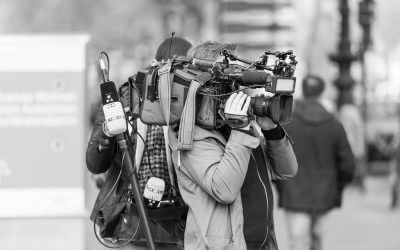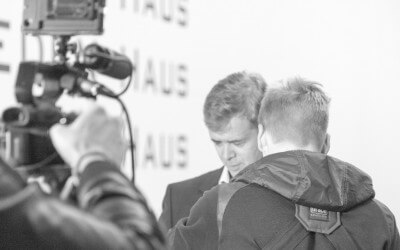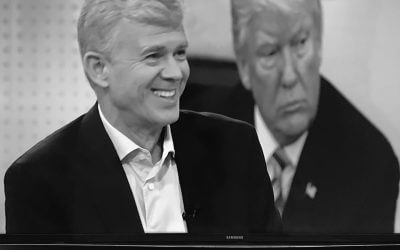Think twice before talking to the media
Be prepared!
The interview request
You’ve received a call from a reporter who wants to interview you. You like the idea and want to confirm right away. But wait a minute! It is time to make an informed decision. Think twice before giving a media interview. It may be an opportunity, but it is also fraught with risk.
Overview
Wait for a second!
If you work for a larger company, ask for help before you decide. Talk to the marketing department. They can help you decide whether to accept an interview, or help you prepare for an interview if you need advice. Especially if you are alone: Think twice!
In my media training sessions, we usually spend most of the time teaching people how to communicate during a media interview. I also tell them what they should do before the interview starts – or before they agree to be interviewed in the first place.
I recommend: Before agreeing to an interview, research the interviewer. Find out as much as you can about the story they’re working on, because the more you know, the better you can prepare for the interview. Most journalists are willing to share at least the basics of the stories they’re working on, and some are willing to go into great detail about their stories.
Should you do the interview?
In case you are uncertain that you want to be interviewed by the media, here are some points to consider:
- What is the subject and focus of the interview, and why did the reporter contact you and not someone else?
- Who else are they interviewing?
Reporters often play it close to the vest on this one, but it’s worth asking. You’ll often be able to get a sense of the tone of the article by learning whether the other sources in the story are friendly or antagonistic toward your cause. - Is the subject currently in the news? How controversial is the subject? What are the risks and chances?
- What is the message you want to come across?
- Who is the reporter? What kind of reporter and personality is it?
- What news outlet does the reporter work for, and who is its audience?
- What do you know about the format (TV, radio, show, news, newspaper, magazine, …)?
For print interviews, ask whether reporters just need a quick quote from you or whether they are writing an in-depth piece that will focus extensively on your work. For broadcast interviews, you’ll be able to learn whether the interview will be live, live-to-tape, or edited. Also, ask how long the interview will last. For television, ask if the format will be a remote, on-set, or sound bites interview. - Where, and how will the interview be conducted (e.g., in person, on the phone, radio, video), and how long will the interview take?
- Does the reporter want to approach the story from any particular perspective?
Some reporters bristle when you ask directly “What is your angle?”, so ask in another way to get the same information in a slightly more subtle manner. - Are you well-prepared, or if not is there enough time to be well-prepared?
Given the fact that everything you say in a media interview can, and may, be shared by the journalist for posterity, it’s important to make sure you are completely prepared. If possible, ask for interview questions ahead of time. - Are there any possible legal consequences?
In case it matters, ask your attorney. - Is the effort worth the investment?
Better think twice before you do a media interview. It may be a chance, and it is full of risks.
Support for your media presence
>You want to make the most of the opportunity. Do you want to face the questions and give convincing answers? Then I can help you prepare for your media appearance.
You decide on the extent of the support. My recommendation: Give yourself and your audience at least one rehearsal with professional feedback. Then you will know for yourself how you and your answers affect your target group, what you should and shouldn't do, where there is potential. Why wait until after you've performed to get such feedback? It's too late to correct. Then it is too late to correct. Cross-fire interviews in particular are very intense, and you only have the opportunity to look at the results afterward.
What does this professional support cost? The fees are listed here. You know best how much it will cost compared to the expected benefit. Take advantage of it. By the way, this can also be done with sessions via telephone or video support.
By the way, many people suffer from severe stage fright when they appear in the media and suffer through the performance. That's a shame, because with the right help, it's not necessary. Just in case ...
Just ask me personally
Please post any questions that may be of interest to other readers in the comments. Looking for professional help?
If you are interested in coaching, training or consulting, if you have organizational questions, or if you want to make an appointment, you can reach me best via this contact form (you can choose whether you want to enter your personal data) or via e-mail (mail@karstennoack.com). The privacy policy can be found here.
Transparency is important. That is why you will find answers to frequently asked questions already here, for example about me (profile), the services, the fees and getting to know me. If you like what you see, I look forward to working with you.
Remarks:
In the address bar of your browser, the URL should begin with "https://www.karstennoack.com/...". This indicates a secure connection (SSL). Whether you enter your real name is up to you.
Essential recommendations for media interviews
What you should keep in mind when being interviewed by the media. Here you will find 19 basic recommendations to help you and your message to be compelling in the media.
26 tips for mastering television interviews
Most of the time it happens unexpectedly. That’s why you’ll find tips for preparing for and participating in television interviews here.
Body language expert explains Trump’s awkward day at the NATO Summit
It may be mere speculation that Donald Trump is compensating for something. Yes, certain behavior may give that impression. Let me analyze Donald Trump’s body language when he met Angela Merkel, Emmanuel Macron, Duško Marković and other leaders at the NATO-Summit in Brussels.

This article is a short excerpt from the more comprehensive course materials my clients receive in a group or individual training or coaching.
Published: June 21, 2008
Author: Karsten Noack
Revision: August 20th, 2023
Translation: ./.
German version:
K:
H:
T: RR
#234



0 Comments